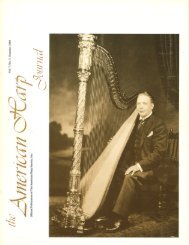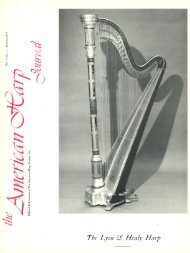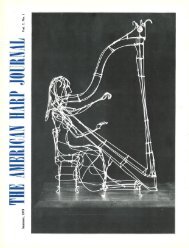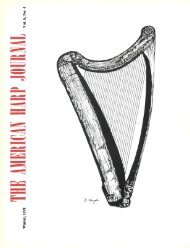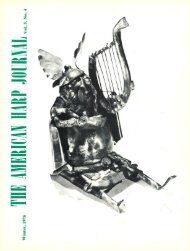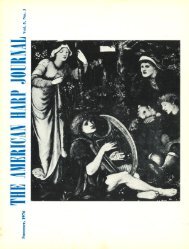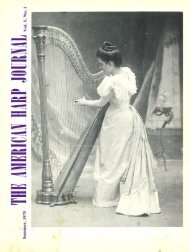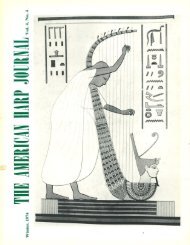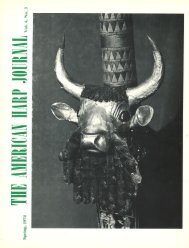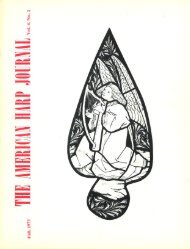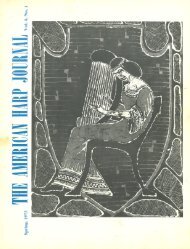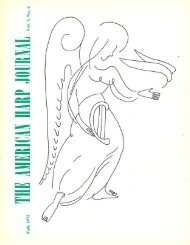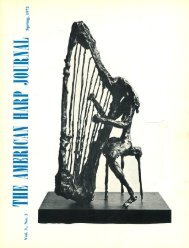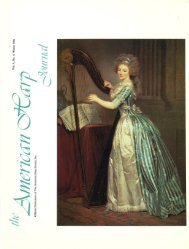You also want an ePaper? Increase the reach of your titles
YUMPU automatically turns print PDFs into web optimized ePapers that Google loves.
Fig. 3. J.J.H. Westphal, "Catalogue thematique des oeuvres de Charles Philippe Emmanuel Bach"<br />
(Brussels Royal Library, Ms. II 4140).<br />
the manuscript bears no marks of Bach's supervision<br />
(dates, numberings, etc. in his hand) suggests that<br />
this only surviving copy of the harp sonata may have<br />
been prepared by Michel after Bach's death-perhaps<br />
in response to a request from Westphal to Bach's<br />
widow and daughter.<br />
If it is interesting to speculate about whether<br />
C.P.E. Bach's harp sonata once existed in at least two<br />
copies, it is even more worthwhile to ponder the<br />
strong probability that at least one other source once<br />
existed: a manuscript (or manuscripts) prepared for<br />
the harpist (or harpists) for whom Bach wrote the<br />
sonata in Berlin. For although not all eighteenthcentury<br />
compositions were written for particular<br />
performers or occasions, few were written with no<br />
prospects of being performed. The study of keyboard<br />
instruments was a popular pastime for amateurs<br />
during Emanuel Bach's lifetime, and there was always<br />
a demand for keyboard pieces. Bach could compose<br />
and publish works for solo keyboard with the<br />
assurance that they would be played. For some of the<br />
chamber music which remained unpublished in his<br />
lifetime and did not circulate widely, Bach probably<br />
did have particular musicians in mind. But in any<br />
event, he could count on finding flutists, oboists,<br />
violinists, violists, cellists, and keyboard players in<br />
generous supply in and around the Berlin of Frederick<br />
the Great. 12<br />
In the case of compositions for the harp, the situation<br />
was altogether different. Little music was written<br />
for the instrument by eighteenth-century composers<br />
before the l 760's because, we can surmise, there<br />
were few harpists who played instruments suited to<br />
the chromatic changes normally required by<br />
eighteenth-century styles. 13 Double and triple harps<br />
had existed since the end of the sixteenth century,<br />
but we do not know how commonly they were used.<br />
The single action pedal harp invented by<br />
Hochbrucker in 1720 does not seem to have attracted<br />
much attention at first; no report has come to light of<br />
the impression it made when Simon Hochbrucker (a<br />
son or nephew of the inventor) brought it to the court<br />
in Vienna in 1728. After its introduction to Paris in<br />
1749 by George-Adam Goeppfert, the popularity of<br />
the pedal harp increased rapidly in France. In 1762,<br />
the year Emanuel Bach wrote his harp sonata, the<br />
first volume of music in France was published in<br />
Paris by Christian Hochbrucker (a younger brother of<br />
Simon). Several other French publications for harp<br />
followed during the l 760's. The vogue of the instrument<br />
was assured when Marie-Antoinette, who<br />
played the harp, came to France in 1770; playing an<br />
elegantly decorated pedal harp became the ultimate<br />
chic. 14 Far less is known of the history of Hochbrucker'<br />
s invention or any other kind of harp in<br />
German-speaking countries prior to the nineteenth<br />
century. The time for the harp may have been approaching<br />
in 1762, but there were not a great many<br />
performers at that time who had mastered it, nor had<br />
many composers written for it. On the rare occasions<br />
when works were composed for harp, they were probably<br />
written for or inspired by a specific performer.<br />
Who were the harpists who might have come to the<br />
attention of C.P.E. Bach in 1762? Among royal patrons<br />
of music with whom Bach was well acquainted,<br />
only two have been touted as accomplished performers.<br />
The frst of these, Frederick the Great (1712-<br />
1786), was primarily a skilled flutist who allegedly<br />
had a slight command of the keyboard. Frederick,<br />
moreover, had no contact with his musicians between<br />
1756 and 1763, the waging of the Seven Years' War<br />
being, at that time, his only concern. 15 <strong>No</strong>r is there<br />
<strong>Winter</strong>/<strong>1980</strong><br />
11




